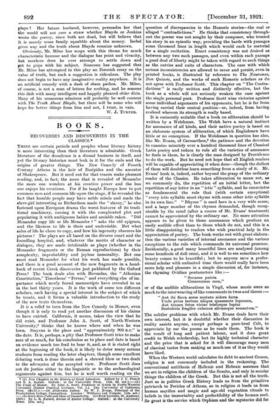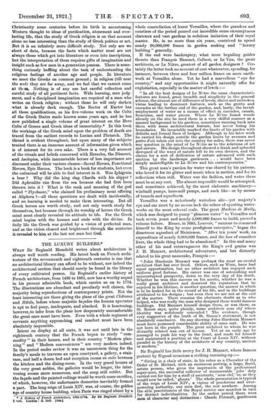BOOKS.
RECOVERIES AND DISCOVERIES IN THE CLASSICS.*
THERE are certain periods and peoples whose literary history is more interesting than their literature is admirable. Greek literature of the decadence is a dismal business in itself, and yet the literary historian must look in it for the ends and the origins of greater things. The New Comely of Fourth Century Athens is the heir of Euripides and the ancestor of Shakespeare. But it need not for that reason make pleasant reading, and, in fact, the more that is revealed of Menander the more one wonders at his creative power and the less one enjoys his creations. For if he taught Europe how to put common men and common life upon the stage, if he revealed the fact that humble people may have noble minds and made the slave-girl interesting as Richardson made the " slavey," he also fastened upon European drama the worst features of its tradi- tional machinery, cursing it with the complicated plot and populating it with ambiguous babies and amiable rakes. "Did Menander copy life or life Menander 9 " asks the old epigram, and the likeness to life is there and undeniable. But what sides of life he chose to copy, and how his ingenuity obscures his pictures ! The plays are all based on the divorce court and the foundling hospital, and, whatever the merits of character or dialogue, they are made intolerable as plays (whether in the Menander fragments or the Roman reproductions) by their complexity, improbability and joyless immorality. But one must read Menander for what his work has made possible, and there is .a good account of the new fragments in a hand- book of recent Greek discoveries just published by the Oxford Press' The book deals also with Hcrondas, the " Athenian Constitution," Timotheus' "Persae," and everything else of im- portance which newly found manuscripts have revealed to us in the last thirty years. It is the work of some ten different scholars, each having a special interest in the subject of which he treats, and it forms a valuable introduction to the study of the new texts themselves.
It is a relief to turn from the New Comedy to Homer, even though it is only to read yet another discussion of his claims
to have existed. California, it seems, takes the view that he did exist, and Professor John A. Scott, of North-Western University,2 thinks that he knows where and when he was born. Smyrna is the place and " approximately 900 B.C." is the date. It is, perhaps, a pity that Professor Scott tries to make sure of so much, for his conclusion as to place and date is based on evidence much too frail to bear it, and, as it is stated right at the beginning of the book, it is likely to deter many serious students from reading the later chapters, though some excellent debating work is done therein and a shrewd blow or two dealt to the advocates of the accepted view. Professor Scott does not do justice either to the linguistic or to the archaeological arguments against him, but he is well worth reading on the • B. New Chapters in the History of Greek Literature. Edited by J. U. Powell and E. A. Barber. Oxford : at the University Press. (10s. ed. net.]—(2) The Unity of Homer. By John A. Scott, Professor of 11 reek in North-Western University (Sather Classical Lectures, Vol. I.). The University of California Press. ($3.25.)—(S) Allitteratio Latina. By W. J. Evans, Principal of the Presbyterian College, Carmarthen. London : Williams and Norgate. 118s. net.] —(4) Greek Hero Cults and Ideas of Immortality. (Cl fiord Lectures, St. Andrews, 1920.) By L. It. Parnell, Rector of Exeter Mese. • Oxford : at the University Press. Ilse. net.]
question of discrepancies in the Homeric stories—the real or alleged " contradictions." He thinks that consistency through- out the poems was not sought by their composer, who treated his story in an episodic way, providing the bards with passages
some Thousand lines in length which would each be material for a 'single recitation. Exact consistency was not desired as between any two such passages, and even within each presage a good deal of liberty might be taken with regard to such things as the entries and exits of characters. The ease with which serious inconsistencies are allowed to occur and persist, even in printed books, is illustrated by reference to The Newcomes, Don Quixote, and the works of such Homeric scholars as do not agree with Professor Scott. This chapter on "The Contra- dictions " is racily written and distinctly effective, but the book as a whole will not seriously weaken the case against the single personal poet. Professor Scott wins victories against
some individual arguments of his opponents, but he is far from having carried their central position—or, indeed, from having realized whereon its strength is really based.
It is eminently suitable that a book on alliteration should be written by a Welshman. The Welsh have a natural instinct
for assonance of all kinds, and their native poetry is based on an elaborate system of alliteration, of which Englishmen have little or no conception. If the Welshman in question has also, like Mr. Evans, of Carmarthen,3 the patience and the devotion to examine minutely over a hundred thousand lines of Classical Latin poetry and reduce to rule all the varieties of assonance he finds in them, he is clearly the man designed by Providence to do the work. But he need not hope that all English readers
will be capable of appreciating it when done—though the dullest of them will doubtless learn something from a study of it. Mr.
Evans' book is, indeed, rather beyond the grasp of the ordinary reader of the Classics. He takes alliteration to mean not, as we commonly do, the repetition of an initial letter, but the repetition of any letter in an " ictic " syllable, and he enunciates as fundamental the rule that (with certain exceptions) " every ictic syllable must rhyme with some other ictic syllable in its own line." " Rhyme " is used here in a very wide sense, and a large number of the rhymes demanded, though recog- nizable by the mind (after a course of Mr. Evans' treatment) cannot be appreciated by the ordinary ear. No more attention appears to be given to those assonances which produce an easily audible effect than to those which do not, and this is a little disappointing to readers who wish practical help in the appreciation of poetry. The book works out with great elabora- tion the various varieties of internal assonance and the various exceptions to the rule which commands its universal presence. Incidentally, a good many beautiful lines are analysed (among some hundreds of dull ones), and it is well to see sometimes how
beauty comes to be beautiful ; but to anyone save a profes- sional scholar with unlimited time there would really have been
more help and pleasure in a simple discussion of, for instance, the rhyming Ovidian pentameters like :— " Securus patria Consenuisse mea," or of the audible alliterations in Virgil, whose musio owes so much to the interweaving of like consonants in twos and threes :— " Aut ibi flava Beres mutato sidere farm Undo Arius laetum siliqua quassante legumen, Aut tenues fetus viciae tristisque lupini Sustuleris fragiles calamos silvamque sonantem."
The subtler problems with which Mr. Evans deals have their own interest, but it is doubtful whether their discussion in reality assists anyone, except perhaps a pure-bred Celt, to appreciate by ear the poems as he reads them. The book is
the result of long and patient labour, and it does great credit to Welsh scholarship, but its highly technical character and the price that is asked for it will discourage many men of classical tastes from making as much use of it as they would have liked.
When the Western world calculates its debt to ancient Greece,
religion is not commonly included in the reckoning. The conventional antithesis of Hellenic and Hebraic assumes that we are in religion the children of the Semite, and only in secular things the children of the Greek. But this is not all the truth. Just as in politics Greek History leads us from the primitive patriarch to Pericles of Athens, so in religion it leads us from human sacrifice and magic and age-old vegetation rituals to beliefs in the immortality and perfectibility of the human soul. So great ie the service which Orphism and the mysteries did for Christianity some centuries before its birth in accustoming Western thought to ideas of purification, atonement and ever- lasting life, that the study of Greek religion is on that account alone no less interesting than the study of Greek politics or art. But it is an infinitely more difficult study. Not only are we short of data, because the facts which matter most are not always those which get into literature or even into inscriptions, but the interpretation of them requires gifts of imagination and insight such as few men in a generation possess. There is some- thing curiously baffling about the task of understanding the religious feelings of another age and people. In literature we meet the Greeks on common ground ; in religion (till near the end) they are far away, and we feel that we cannot come at them. Nothing is of any use but careful collection and careful study of all pertinent facts. Wide learning, sure judg- ment, and a disciplined imagination are required of a man who writes on Greek religion ; without these he will only darken what is already dark enough. The Rector of Exeter has all these qualifications, as his five-volume work on the Cults of the Greek States made known some years ago, and he has now published a single volume of great interest on the Hero Cults of Greece and Greek ideas of immortality.' In this book the workings of the Greek mind upon the problem of death are traced from the earliest records to Lucian and Plutarch. The thread is evident throughout, but upon many of the subjects treated there is an immense amount of information given which is of interest for its own sake. There is a very full account of the rituals and beliefs concerned with Heracles, the Dioscuri, and Aeclepios, while innumerable heroes of less importance are discussed under their various classes—Sacral Heroes, Functional Heroes, Epic Heroes. The book is a book for students, but even the unlearned will be able to find interest in it. Was Iphigenia a bear ? Why did the king slap Charila with his slipper ? Did Aphrodite rise from the sea because she had first been thrown into it ? What is the rank and meaning of the god called " Flyehaser," who claimed his preliminary meat offering at Aliphera ?—all these questions are dealt with incidentally, and no learning is needed to make them interesting. But all Greek heroes are worth study, and not only worth study for themselves, but because through its worship of heroes the Greek mind most clearly revealed its attitude to life. For the Greek mind begins with the human and ends with the divine. In daily life the Greek was guided by a vision of perfected man, and as the vision cleared and brightened through the centuries it revealed to him at the last not man but God.



































 Previous page
Previous page